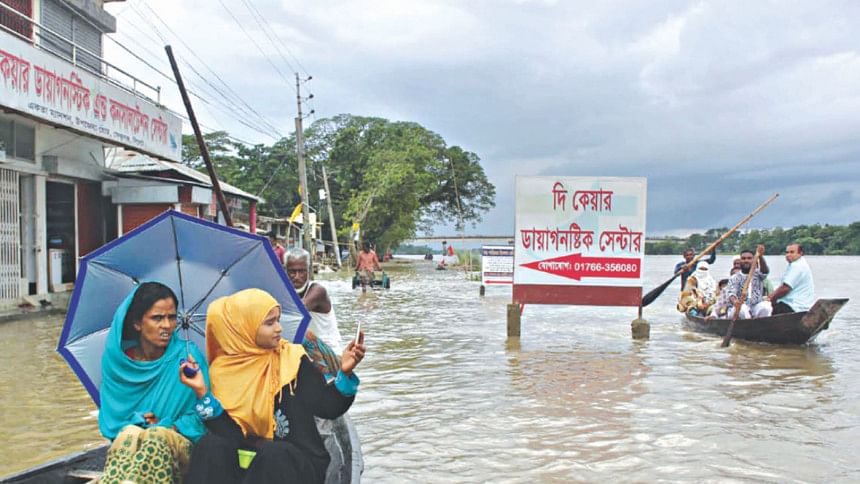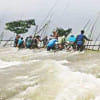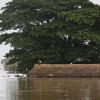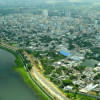Floods worsen in Sylhet, Moulvibazar

Sylhet might be on the verge of a devastating flood like that of 2004 as most of its upazilas have been affected.
All the rivers, canals, haors and marshes of Sylhet are overflowing due to heavy rain and rush of water from upstream.
The overall flood situation in Moulvibazar is also worsening. People of its three upazilas are facing a food crisis as well.
Education institutions were supposed to reopen on Saturday after Eid holidays but more than 100 schools are under water.
The district administration has declared 161 primary schools and 13 high schools closed until the water receded, said Deputy Commissioner in Sylhet Rahat Anwar.
Shyamal Chandra Singha, headmaster of Pashchim Borni High School, said they had postponed all academic activities as the school and its adjoining roads went under water.
Most of the schools have already postponed half-early exams scheduled for the first week of this month.
At least 3,000 hectares of farmland has been flooded. This could be detrimental to this season's paddy production, according to the Agricultural Extension Department in Sylhet.
The Water Development Board (WDB) in Sylhet said the Kushiara was flowing 20 to 30 points above the danger level at different points.
Divisional Commissioner Nazmanara Khanom said the administration was considering it a natural disaster and had put plans for relief and rehabilitation in motion.
In Moulvibazar, the government has distributed rice and cash to the affected families, but the recipients alleged that the amount of the relief materials was inadequate.
More than one lakh flood-hit people in Juri, Kulaura and Barlekha upazilas are in need of relief, sources in the Moulvibazar administration said.
Bijoy Indra Sankar Chowdhury, executive engineer of the WDB in Moulvibazar, said the flood situation was worsening as the Kushiara continued to flow above the danger level.
District Primary Education Officer Abdul Alim told The Daily Star that 142 schools remained closed due to the floods.
Masudur Rahman, upazila education officer of Kulaura, said 35 schools were under water and more institutions were being affected.
Besides, 27 primary schools in Juri and 46 primary schools in Barlekha had been closed due to floods, Alim said.
Flood shelters have been set up in several education institutions that had not been affected by the floods, suspending their academic activities as well.
Bhukshimul Union Parishad Chairman Azizur Rahman Monir said around 45,000 people had been marooned in his union and were in need of immediate relief.
At least 30,000 people were trapped in floodwater in Joychandi union of Kulaura and were facing acute shortage of food and drinking water, said Joychandi Union Parishad Chairman Kamar Uddin Ahmed.
Joblu Haider, Kulaura agricultural officer, said 1,200 hectares of farmland had been flooded.
“My vegetables on four bighas of land have gone under water,” said Afsar Ali, a farmer of Bhukshimul village in Kulaura.
Joblu added that farmers were facing acute crisis of fodder for their cattle.
Deputy Commissioner in Moulvibazar Tofail Islam said they had already allocated 294 tonnes of rice and issued 49,200 VGF cards for the affected people.


 For all latest news, follow The Daily Star's Google News channel.
For all latest news, follow The Daily Star's Google News channel. 








Comments